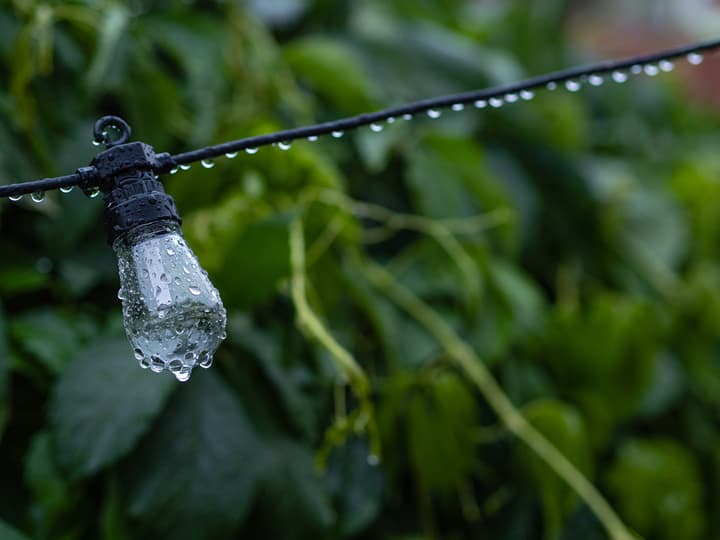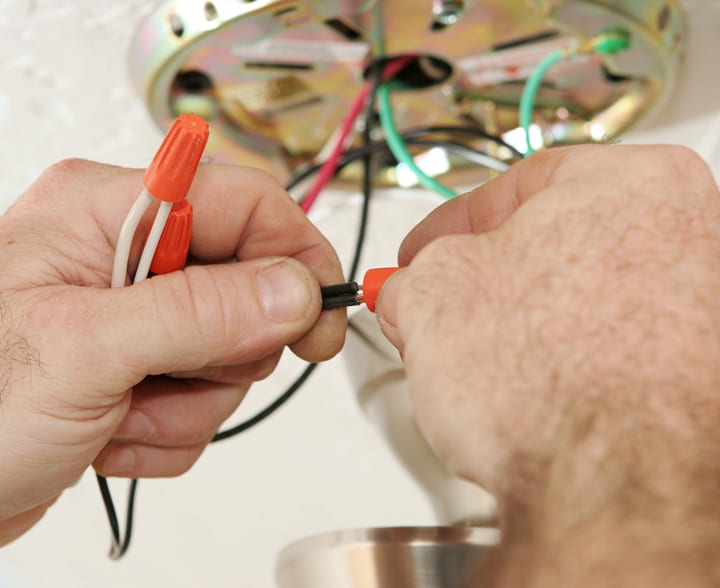As we know, electricity and water aren’t exactly best buds. They get on really well, but you know what I mean.
It’s not a relationship we like to encourage!
So how do we solve the challenge of outdoor lighting?
Unless you live in an actual desert, you’re going to have some rainfall at some point – some unlucky people more than others, depending on your local climate.
How do you protect any outdoor lights from the rain?
When installing lights outdoors, buy fully waterproof ones already. Make sure any connections are sealed and that sockets are shielded. Lights can be installed under a covered porch but should still be watertight to prevent moisture from getting in.
There are a lot of considerations with outdoor lighting, and you must bear them in mind to keep your lighting (and your entire home) safe.
So let’s explore:
- Whether outdoor lighting is waterproof by default
- How you can make sure to waterproof your outdoor lighting
- Whether sockets and connectors need to be waterproofed
- If you can use patio and Christmas lights when it’s raining
Is Outdoor Lighting Waterproof?

All outdoor lighting should be waterproof, but that doesn’t mean it is.
You need to be careful when you buy outdoor lights to ensure that they’re waterproof.
You’re looking for an IP rating.
IP stands for ingress protection – literally, how protected is the light from ingress of water or dust particles.
It’s a double-digit number, with the first digit referring to solid (dust) particles and the second related to water.
That digit runs from 0 (not waterproof) to 9K (can withstand 176 degrees Fahrenheit, high-pressure water jets).
For outdoor lighting, it’ll likely be 4 (withstands splashes), 5 (water jets), or 7 (powerful water jets and immersion up to 1 meter).
Always make sure to buy waterproof lighting that is verified to IPX4 or better.
For any lighting near the ground (like decking lights), go for IPX7, in case of any settling water that could submerge it.
How To Waterproof Outdoor Lights?

Whether you’re buying landscape lights, string patio lights, or porch lights, they must be waterproof.
Hanging lights should be OK at IP44 or better. Still, for anything low to the ground where it could be subjected to constant contact with water – even if we’re talking shallow puddles – then IP67 is the way to go.
You might assume that hanging a porch light underneath a covered porch negates the need for waterproofing.
But remember that rain isn’t vertical, it can come down at an angle, and it can easily rebound off a surface and reach the light.
You might also assume that a couple of small splashes aren’t going to cause problems. Still, any amount of water that can get into an unsealed light can cause serious hazards.
Also, think about the temperature – if it’s been raining and a couple of droplets get into a sealed light, they could freeze when the air gets colder.
Those droplets will expand, and that ice could further break the light, turning it into a bigger risk.
So never assume that shelter is enough. Always be safe and buy waterproof light fixtures.
Sheltered fixtures with an IP44 rating should be OK if they’re away from the ground.
Do I Need To Waterproof Sockets And Connectors?

So you’ve been careful to select waterproof lights, and you’ve planned where they’re going to be installed to protect them from some of the more harsh elements outdoors.
All sorted, right?
Not quite. Because you need to wire up those lights and connect them to the power.
And it’s these connections that are your weakest points in a circuit, where water is most likely to get into it and cause danger.
You absolutely need to make sure sockets and connectors are waterproof. Here’s how:
Sockets
When talking about sockets, you’re likely going to be plugging your lights into an indoor socket or an outdoor one, and you may need to use an extension cord.
Anything indoors is going to be fine. However, anything outdoors needs to be waterproofed.
You can fit a waterproof box around them for outdoor sockets to protect them from the elements.
Outdoor sockets don’t generally come with these as standard. Instead, they’re designed to be used only when the weather is good – for an electric mower or to inflate a hot tub.
If you want to leave lights plugged into them at all times, no matter the weather, just install one of these boxes.
Some cords claim to be waterproof, but they can’t be perfect if you need to use an extension cord.
The best bet is to use a safety cover like this.
Just connect the cords together and then place the connection inside this sealed box to protect it.
Connectors

When connecting the wires to your lights, you’ll need to make sure the connection is sealed.
There are a few different options for this.
One of the easiest is with a sealed nut connector. These work just like indoor wire nuts, but they contain a waterproof sealant.
Simply twist the exposed wires, and insert them into the nut, and the exposed area will be covered by the sealant.
Twist the nut to keep the wires in place, and you’re done.
Another good option, especially if you’re soldering any connections, is waterproof heat shrink tubing.
Simply thread one wire through the tubing before connecting the wires, then position the tube over the connection.
Gently heat it and it will shrink to form a sealed, watertight cover over the connection.
Can Patio and Christmas Lights Be Used In The Rain?

As long as you buy a suitably waterproofed patio and Christmas lights, they’re perfectly safe to operate in all weather.
You can switch them on during the rain, and they will work fine.
The rating you’re looking for is the IP rating. For example, Christmas and patio lights are likely to be rated IP44, IP65, or IP67.
These should all be OK, although IP44 is only safe for “splashing” of water, so you should be careful if you hang them and then decide to pressure wash the side of your home.
Though let’s be honest, you’re unlikely to be doing that during the winter.
IP67 lights can withstand powerful water jets and immersion, which is why many decking lights are rated this lightly.
As long as any hanging lights are IP44 or better, they’ll be safe.
There are some other certifications that you might see on some electrical packaging, but they aren’t really relevant.
CSA waterproof ratings are a specific Canadian measurement of sealed lighting enclosures.
FCC ratings may be mentioned on Christmas or patio light packaging, but they’re irrelevant to waterproofing altogether – FCC-rated electrical devices are those which give off a safe level of electromagnetic radiation.
Final Words
If outdoor lights couldn’t be waterproofed, nobody would go to the effort of installing them.
Imagine undoing all that work as soon as the rainy season starts?
Thankfully, if you’re careful in choosing the right waterproof-rated lights and making sure connections are sealed, you shouldn’t have any issues.
And on those dank, rainy nights, you can enjoy a warmer welcome home with your patio lights greeting you or a festive Christmas scene during those darker winter evenings.
Have you had any outdoor lighting horror stories due to the weather?
Or do you have any tips I’ve missed?

